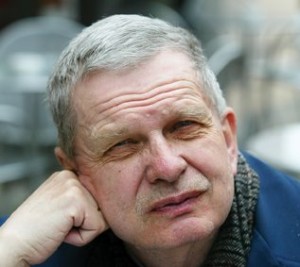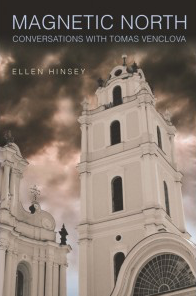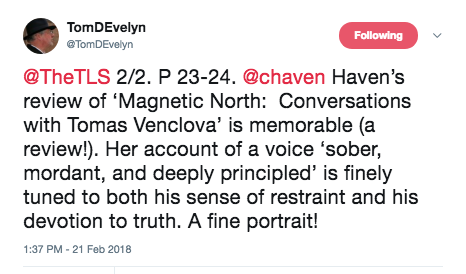
A “historical optimist” (Photo: Dylan Vaughan)
My review of Lithuanian poet, essayist, and freedom fighter Tomas Venclova‘s Magnetic North, “No Pigeons in the Attic,” is featured in this week’s Times Literary Supplement here. Readers of the Book Haven will recognize the name of the eminent European intellectual, although it is, in general, too little recognized on this side of the Atlantic. We’ve written about him here and here and here and here, among other places. Magnetic North is a book-length Q&A with translator Ellen Hinsey, recapping his life, his art, and his nation’s turbulent history.
A few excerpts from my piece:
He rejects the romantic notion that a poet’s work only thrives in his or her homeland. “It would be absurd to maintain that a writer needs permanent contact with his or her native soil and withers when deprived of it”, he says, citing Marina Tsvetaeva, Nabokov and Brodsky among the dislocated Russians; Mickiewicz, Norwid, Miłosz and Gombrowicz among the Poles. He finds something fortunate even in exile, and seems to enjoy the role of lucid observer: “As a rule, one sees the general contours of the country’s development more clearly if one is not embroiled in local squabbles. For an ‘outsider,’ these contours are projected on the larger screen of history”. But his international wanderings have not eroded his love of country – he has written three books on Vilnius, one of them the most commercially successful of his long career. He likens his beloved capital to a European Jerusalem. “I once said that these heterogeneous, asymmetric, and extraordinary buildings kept us from forgetting the very idea of civilization”, he recalls. “I still believe this.”
***
 Lithuanian, the native tongue of 3 million people, continues to fascinate and sustain him, as it is “not only archaic, but rich and sonorous, virtually on a par with the Greek of Homer and Aeschylus. To me, as a poet, this has been rewarding”. He likens its rough phonetics to feldspar, adding that it has retained an archaic vocabulary and grammatical structure akin to preclassical Latin of the third century BC. And, Venclova points out, while it is one of the classical Indo-European languages, like Latin, Ancient Greek, Gothic, or Old Slavonic, it is the only one of them that is still alive. It nearly was not so. In the nineteenth century, it was in serious decline, like Gaelic or Welsh. Venclova compares it to the former, another archaic language that embodies an ancient past. Neighbouring Poland views Lithuania the way the English view Scotland, as wild and untamed, with “more primeval forests and a valiant but not-too-civilized people”.
Lithuanian, the native tongue of 3 million people, continues to fascinate and sustain him, as it is “not only archaic, but rich and sonorous, virtually on a par with the Greek of Homer and Aeschylus. To me, as a poet, this has been rewarding”. He likens its rough phonetics to feldspar, adding that it has retained an archaic vocabulary and grammatical structure akin to preclassical Latin of the third century BC. And, Venclova points out, while it is one of the classical Indo-European languages, like Latin, Ancient Greek, Gothic, or Old Slavonic, it is the only one of them that is still alive. It nearly was not so. In the nineteenth century, it was in serious decline, like Gaelic or Welsh. Venclova compares it to the former, another archaic language that embodies an ancient past. Neighbouring Poland views Lithuania the way the English view Scotland, as wild and untamed, with “more primeval forests and a valiant but not-too-civilized people”.
***

And the historical winner is…
Venclova has described himself as an “historical optimist”, which he characterizes thus: “All will end well, but I will not see it”. He views with dismay the growing nationalism that is threatening the cosmopolitanism he embraces. He notes that everyone in the twentieth century was a “loser” – Franz Joseph, Wilhelm II, Nicholas II, Hitler, Mussolini, Stalin and Churchill, even Mahatma Gandhi. All except for Archduke Franz Ferdinand’s assassin, an obscure Serbian nationalist: “The only winner was Gavrilo Princip, since his mentality has survived – indeed, it has resolutely endured”.
Read the rest here. As for the title, “No Pigeons in the Attic,” well … read the article.
Postscript on 2/21: And some nice feedback in the TLS letters column, as tweeted:

Tags: "joseph brodsky", Czeslaw Milosz, Ellen Hinsey, Gavrilo Princip, Tomas Venclova
